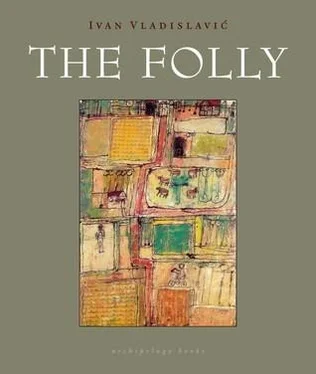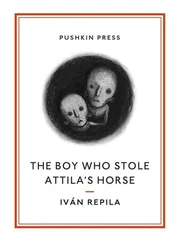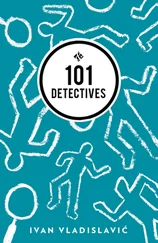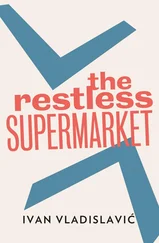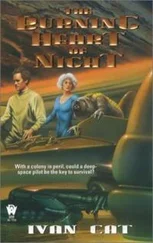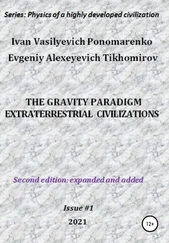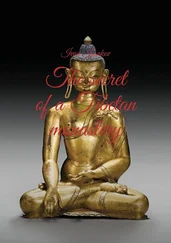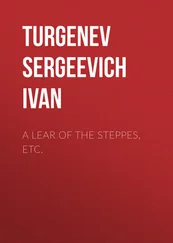“Here it is!” Nieuwenhuizen said. “I’ve been sitting on it all along.”
Malgas circumnavigated the tree and the tent, noting with approval the prudent depth of the moat and testing the tension of the guy-ropes. Some bulky objects hung in plastic bags from the lower branches of the tree. Malgas, who prided himself on his knowledge of packaging and its relationship to contents, could not resist the challenge. After an inquiring glance at the back of Nieuwenhuizen’s grizzled head he palpated one of the bags thoroughly, but to his surprise could not determine what it contained. Never mind, he moved on. Behind the tent he found some implements that were more readily identifiable: a row of rough-hewn wooden spoons dangling from a length of string (the stirring-bone was nowhere to be seen), a stack of misshapen plates and saucers, a tin of creosote with a brush resting across it, a hurricane-lamp, a slab of discoloured slate supporting a grey liver. He prodded this dismal organ with a blunt forefinger and found it firm. But in a cove under the hedge were yet other gadgets whose functions he could not divine, despite his many years of experience in Hardware.
“You’ve got some fascinating things here,” Malgas exclaimed. “What’s this?” He held up a contraption consisting of a luminous orange traffic-beacon mounted upside-down in a cardboard box and bound with copper wire.
Nieuwenhuizen’s head spun round. He looked at the eager expression on Malgas’s face and at his thick fingers gripping the gadget. “Bush rain-gauge,” he said sadly, “calibrated, measures rainfall. Horn also works.”
“Useful. . And this?”
“Mousetrap. Field-mice.”
“This?”
“Cookie cutter.”
Nieuwenhuizen found the questions tiresome.
“What’s that you’re making there?” Malgas asked, though he was not insensitive to Nieuwenhuizen’s tone. As he spoke he rolled a stone closer and sat down on it. He was disappointed to find that Nieuwenhuizen’s torso blocked his view of the tent’s interior.
“This is a teacup,” said Nieuwenhuizen, holding up a dented tin and turning it from side to side so that Malgas could admire it. “Almost finished. Just got to round off the handle here.” He perked up suddenly, shooting out one leg like a railway signal. “Let’s make a pot of tea and you may have the honour of testing out my cup.”
The coals in the fireplace were warm. Under Nieuwenhuizen’s attentive gaze, Malgas fetched kindling from the woodpile, built up a fire, ladled water into the pot, noting with relief that it had three legs after all, and, following instructions, measured the requisite quantity of dried leaves from a plastic bag. “What is this stuff?” he asked as he sprinkled the leaves onto the bubbling water.
“Herbaceous infusion,” Nieuwenhuizen replied. “Tisane, excuse the jargon. Very good for you. Purifies the blood and builds you up.”
When the tea had steeped to Nieuwenhuizen’s satisfaction, Malgas was instructed to strain it through a shop-soiled oil-filter and sweeten it with honey from a jar.
Malgas reported that the new teacup served its purpose adequately
— it certainly didn’t leak — but its serrated rim threatened his lip and its ear was too small to accommodate his forefinger.
“I’m afraid it’s made for a less substantial digit,” Nieuwenhuizen explained with a good-humoured cackle, holding up his own skinny forefinger to illustrate the point. “Oh my.”
Despite the honey the tea tasted of oil and rust.
“This is the life,” said Malgas, when they were both ensconced on stones with their teacups resting on their stomachs and their legs stretched out to catch the afternoon sun.
A silty silence descended upon them. Malgas savoured its meaningful elements: the rubbery squeaking of his host’s boots against a grease-spattered stone; the hissing of the sticks in the fireplace; insects scurrying in the grass; dry leaves rattling in the hedge; his cup hiccuping as its joints expanded; a distant roar of traffic.
Through half-closed lids Nieuwenhuizen charted the outstanding features of Malgas’s face, ear to ear and quiff to chin.
When they had drained their cups, Malgas sighed contentedly and said, “So. When does the building begin?”
“Patience, patience,” Nieuwenhuizen murmured sleepily, screwing his eyes shut to make Malgas disappear. “I’ve got all the time in the world.” The breathless pause that followed insisted that further explanation was called for. “You can’t rush the building of a new house. You’ve got to get the whole thing clear in the mind’s eye.” Another pause insisted. “Take it from me. I’ve been acclimatizing, building up my strength for the first phase: namely, the clearing of the virgin bushveld.”
“What do you consume, to build yourself up I mean?”
“Oh, birds, roots, that kind of thing. Berries. I’m living off the land. Naturally, I get my basics from the corner café, and the occasional luxury to keep me going. I’m especially fond of a chocolate digestive.”
The air thickened. Nieuwenhuizen kept his eyes closed. Minutes coalesced into hours, oozed by, and Malgas found himself dozing off. Perhaps it was the tea? Or was it Nieuwenhuizen’s husky voice, rising and falling like a wind through the treetop?
They discussed edible ground cover, drifted off, moulds, hydroponics, broccoli, market gardens, touched on barter (Nieuwenhuizen waved a bath mat woven from plastic bags), drifted off again, bumped against Hardware (Malgas revealed his T-shirt, which showed an overalled manikin, who bore a passing resemblance to Malgas himself, holding a huge spangled nail in one hand and a hammer in the other), hinges, handles, hafts, wallpaper, sandpaper, zinc, sink, sank, surfaced again into the niceties of skinning a cat, dropped off, slid in slow motion through spec housing and restaurant rubbish bins, recycled waste and domestic security gates, found themselves talking about the weather.
At length the sun dipped towards the red roof of Malgas’s house, which for some time had appeared to him through his eyelashes as a distant koppie. Then the elongated shadow of his wall touched his toes and he awoke to an uncomfortable recollection of the purpose of his visit.
“You find out what his real name is,” Mrs Malgas had announced bitterly, “or don’t even bother to come back.”
Mr Malgas looked into the swampy bottom of his teacup and assembled a question.
The house, when it was emptied of Mr’s absorbing presence, seemed more full of objects. They multiplied and grew in stature, their edges became sharper, their surfaces more reflective. Mrs Malgas moved among them, running a finger along the scalloped edges of display cabinets, stooping to blow dust off polished table-tops, pinching fluff off the velveteen shoulders of armchairs. She felt lonely. Mr had been gone for hours, and she could no longer bear the sight of him, reclining at the fireside with his hands behind his head and his feet up, as if he was in the privacy of his own home.
She took a bone-china shoe from the mantelpiece and turned it over in her hands. The shoe was slim and white, with a gilt buckle and a wineglass heel. It feels as if I’ve always had this, she thought, but that’s impossible. Always. Slipper. It must have come from somewhere? A gift from Mr? For some reason, it called to mind the day on which he’d bricked up the fireplace. She saw him, kneeling in front of the gaping hole, holding a trowel laden with wet cement in one hand and a brick in the other. His hair was standing on end and his shoulders were dandruffed with plaster chips and wood shavings. When she came in with the tea-tray he looked over one flaky shoulder and smiled woodenly, as if he was an advertisement for DIY products.
Читать дальше
